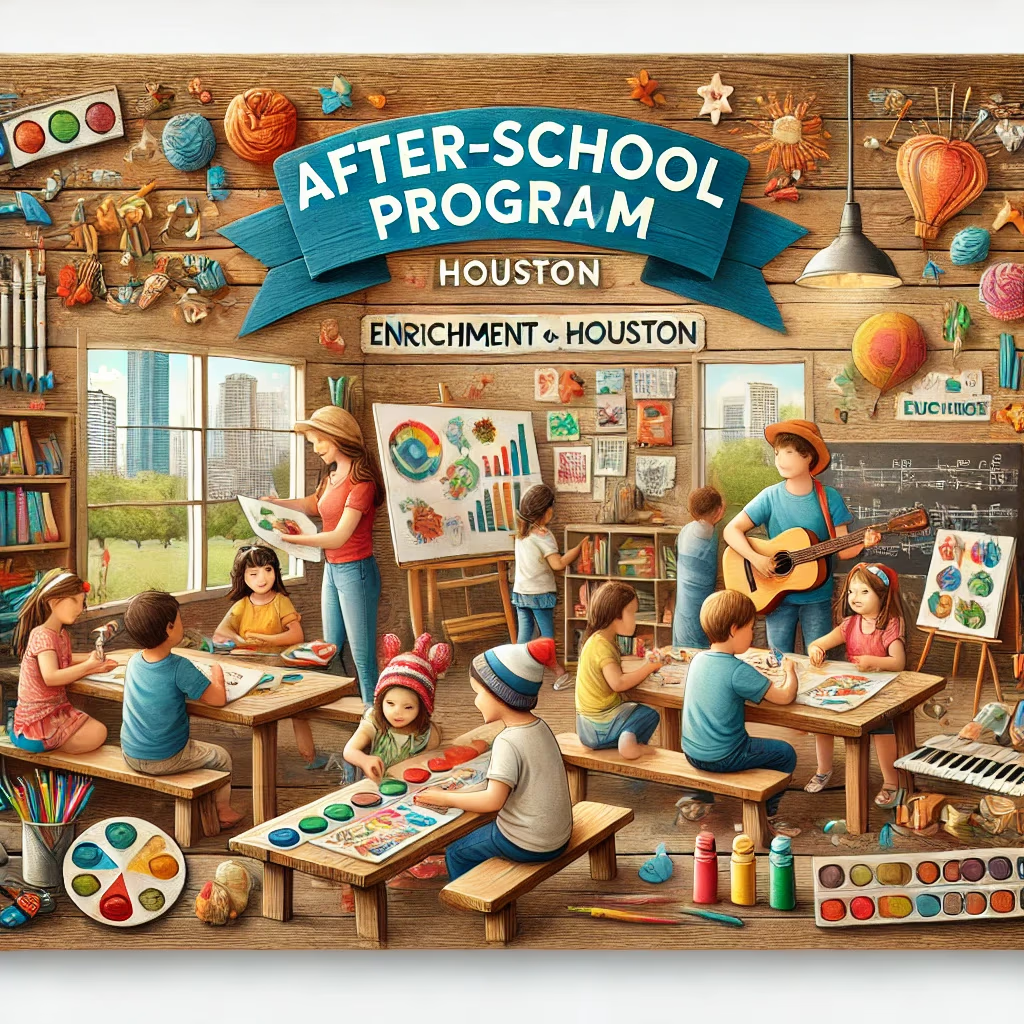After-School Programs in Houston That Enrich and Educate
Date Published

After-school programs play a pivotal role in the development of children and adolescents, serving as a bridge between the structured environment of school and the unstructured time that follows. These programs provide a safe haven for students, particularly in urban areas like Houston, where many families may face challenges such as long work hours or limited resources. By offering a structured environment, after-school programs help mitigate risks associated with unsupervised time, such as involvement in delinquent behavior or exposure to negative influences.
They also foster a sense of community and belonging, which is crucial for the emotional and social development of young people. Moreover, after-school programs contribute significantly to academic success. Research has consistently shown that students who participate in these programs tend to perform better academically than their peers who do not.
This is particularly important in a diverse city like Houston, where educational disparities can be pronounced. By providing additional support and resources, after-school programs can help level the playing field, ensuring that all children have access to the tools they need to succeed. The holistic approach of these programs not only addresses academic needs but also nurtures social skills, emotional intelligence, and physical well-being.
Key Takeaways
- After-school programs provide a safe and structured environment for children after the school day ends, offering a variety of enrichment activities and academic support.
- Houston after-school programs offer a wide range of enrichment activities, including arts and culture, STEM education, sports, and community involvement, to cater to diverse interests and talents.
- Academic support and tutoring are key components of Houston after-school programs, helping students to reinforce their learning and improve their academic performance.
- Arts and culture play a significant role in after-school enrichment, fostering creativity, self-expression, and cultural awareness among children in Houston.
- STEM education is a priority in Houston after-school programs, offering hands-on learning experiences and opportunities for children to explore science, technology, engineering, and math in engaging ways.
Enrichment Activities Offered in Houston After-School Programs
Unleashing Creativity
These activities often include arts and crafts, music lessons, and drama clubs, which allow children to explore their creative sides. For instance, programs may offer painting classes where students can learn different techniques and express their emotions through art.
Developing Essential Skills
Such activities not only enhance creativity but also improve fine motor skills and boost self-esteem as children see their artistic abilities develop. Additionally, many after-school programs in Houston incorporate technology-based enrichment activities.
Preparing for the Future
Coding clubs and robotics workshops are becoming increasingly popular, providing students with hands-on experience in fields that are essential for future job markets. These programs often partner with local tech companies or universities to offer workshops that teach coding languages or robotics engineering. By engaging students in these innovative activities, after-school programs not only prepare them for future careers but also instill a sense of curiosity and problem-solving skills that are vital in today’s fast-paced world.
Academic Support and Tutoring in Houston After-School Programs
Academic support is a cornerstone of many after-school programs in Houston, addressing the diverse educational needs of students. These programs often provide tutoring services that cater to various subjects, including math, science, reading, and writing. For example, a program might offer small group tutoring sessions where students can receive personalized attention from qualified educators or volunteers.
This individualized approach allows students to work at their own pace, reinforcing concepts learned during the school day and helping them overcome specific challenges. Furthermore, after-school programs frequently incorporate homework assistance into their schedules. This not only helps students complete assignments but also teaches them valuable study skills and time management techniques.
In a city as diverse as Houston, where students come from various educational backgrounds, this support is crucial. Programs may also utilize technology to enhance learning; for instance, they might provide access to online resources or educational software that reinforces classroom learning. By creating an environment conducive to academic growth, after-school programs play an essential role in fostering lifelong learning habits.
The Role of Arts and Culture in After-School Enrichment
The integration of arts and culture into after-school programs is vital for fostering creativity and cultural awareness among students. In Houston, a city known for its rich cultural diversity, after-school programs often celebrate this heritage through various artistic endeavors. Programs may include dance classes that explore different cultural styles, such as ballet, hip-hop, or traditional folk dances from around the world.
Such exposure not only enriches students' understanding of different cultures but also promotes inclusivity and respect for diversity. Moreover, arts education has been shown to enhance cognitive development and critical thinking skills. For instance, participating in theater productions can improve public speaking abilities and boost confidence as students learn to express themselves creatively.
Additionally, visual arts projects encourage problem-solving and innovation as children experiment with different materials and techniques. By prioritizing arts and culture within after-school enrichment activities, these programs help cultivate well-rounded individuals who appreciate the beauty of diversity and creativity.
STEM Education in Houston After-School Programs
STEM (Science, Technology, Engineering, and Mathematics) education has gained significant traction in after-school programs across Houston. Recognizing the importance of preparing students for careers in these fields, many programs have developed specialized curricula that focus on hands-on learning experiences. For example, students might engage in science experiments that explore fundamental principles of physics or chemistry, fostering a love for inquiry and exploration.
These practical applications of STEM concepts not only make learning enjoyable but also help demystify complex subjects. In addition to traditional STEM activities, many after-school programs in Houston are incorporating innovative technologies such as 3D printing and virtual reality into their curricula. These tools provide students with unique opportunities to design and create projects that reflect real-world applications of STEM knowledge.
For instance, a program might allow students to design a prototype using 3D modeling software before printing it out with a 3D printer. Such experiences not only enhance technical skills but also encourage collaboration and teamwork as students work together on projects. By emphasizing STEM education within after-school programs, Houston is equipping its youth with the skills necessary for success in an increasingly technology-driven world.
Sports and Physical Activity in After-School Programs
Teamwork and Physical Fitness
Many programs offer organized sports teams or recreational activities that encourage teamwork and physical fitness. For example, basketball leagues or soccer clubs provide students with opportunities to develop athletic skills while fostering camaraderie among peers.
Benefits of Participation
Participation in sports has been linked to numerous benefits, including improved physical health, enhanced social skills, and increased self-discipline. In addition to traditional sports, after-school programs often incorporate fitness activities such as yoga or dance classes. These alternatives cater to a broader range of interests and abilities, ensuring that all students can find an activity they enjoy.
Healthy Lifestyles and Nutrition Education
Programs may also emphasize the importance of healthy lifestyles by providing nutrition education alongside physical activities. By instilling healthy habits at a young age, after-school programs contribute to the overall well-being of students while promoting lifelong fitness practices.
Community Involvement and Leadership Development in After-School Programs
Community involvement is a key aspect of many after-school programs in Houston, fostering a sense of responsibility and leadership among participants. Programs often encourage students to engage in community service projects that address local needs, such as organizing food drives or participating in environmental clean-up efforts. These experiences not only benefit the community but also instill a sense of pride and accomplishment in students as they see the positive impact of their efforts.
Leadership development is another critical focus within after-school programs. Many initiatives include workshops or mentorship opportunities designed to cultivate leadership skills among participants. For instance, older students may be encouraged to take on leadership roles within the program by mentoring younger peers or leading group activities.
This peer-to-peer interaction fosters a supportive environment where students can learn from one another while developing essential skills such as communication, decision-making, and conflict resolution. By emphasizing community involvement and leadership development, after-school programs empower students to become active contributors to society.
Finding the Right After-School Program for Your Child in Houston
Choosing the right after-school program for your child in Houston involves careful consideration of various factors to ensure it aligns with your child's interests and needs. Start by assessing your child's preferences—whether they are inclined towards sports, arts, academics, or technology—and look for programs that offer those specific activities. Many organizations provide detailed descriptions of their offerings online or through brochures; reviewing these materials can help narrow down your options.
Additionally, consider the program's location and schedule to ensure it fits seamlessly into your family's routine. Proximity to home or school can be crucial for convenience, especially for working parents. It’s also beneficial to visit potential programs in person if possible; this allows you to observe the environment and interact with staff members who will be responsible for your child's care and development.
Engaging with other parents can provide valuable insights into their experiences with specific programs as well. Ultimately, finding the right after-school program requires thoughtful exploration to ensure it supports your child's growth while providing a safe and enriching environment.
